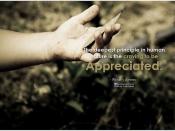When describing nature, one must look at the speakers past experiences. The speaker talks about his past experiences of the "deep rivers," "lonely streams," and large "mountains." He rather carefully describes the process of his seeing as it unfolds, like the "landscape to a blind man's eye". He put into words that nature is not firm, rather it is free flowing and unique. It does not go by certain rules but is random and yet crystal-clear. The speaker then describes how his memory of these "beauteous forms" has worked upon him in his absence from them: when he was alone, or in crowded towns and cities, they provided him with "sensations sweet, / Felt in the blood, and felt along the heart." The memory of the woods and cottages offered "tranquil restoration" to his mind, and even affected him when he was not aware of the memory, influencing his deeds of kindness and love He begins to divide the landscape: on one hand is the river, and on another is the sky.
These two very different settings in a way give the impression to be connected by the "steep and lofty cliffs" The speaker talks about him losing something great, but gaining something even greater. Wordsworth begins to realize and understand the bonds of human beings and how not only we affect each other but outside forces also affect us.
That time is now past, he says, but he does not mourn it, for though he cannot resume his old relationship with nature, he has been amply compensated by a new set of more mature gifts; for instance, he can now "look on nature, not as in the hour / Of thoughtless youth; but hearing oftentimes / The still, sad music of humanity." And he can now...


